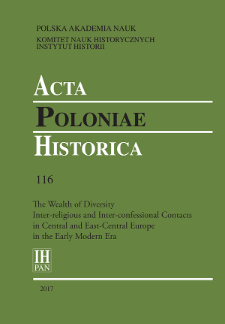
Object
Title: Coping with Religious Diversity in Everyday Life in the Borderlands of Western Europe: Catholics, Protestants and Jews in Vaals
Subtitle:
Acta Poloniae Historica T. 116 (2017) ; The Wealth of Diversity Inter-religious and Inter-confessional Contacts in Central and East-Central Europe in the Early Modern Era
Contributor:
Hyatt, Francesca : Ed. ; Institute of History of the Polish Academy of Sciences ; Polish National Historical Committee
Publisher:
Instytut Historii Polskiej Akademii Nauk
Place of publishing:
Description:
Type of object:
Abstract:
After the re-Catholization of the Free Imperial City of Aachen (1611–16), Protestant congregations were forced to operate underground until the Reformed Church – openly supported by the Dutch States General – found a new place of refuge in the neighbouring Dutch village of Vaals. Ca. 1680, Vaals developed into a multiconfessional site of religious freedom where Roman Catholics, Germanand Frenchspeaking Reformed, Lutherans, and Mennonites lived peacefully side by side. With the exception of everyday controversies in the early decades, the preachers of different Protestant congregations worked together. Violence on religious grounds was not part of daily life in Vaals, although it did at times intrude from the outside. Examples of this were the violent attacks on Protestant churchgoers in the middle of the eighteenth century, which were carried out by lower-class Catholics from Aachen. The Catholic clergy, on the other hand, did not engage in hate sermons. Moreover, the presence of Jews did not cause problems in Vaals and the only documented action against Jewish property was not motivated by anti-Judaism. For the Protestants of this distinctly Catholic area, Vaals became an important place of refuge for the public exercise of their faith. The diverse congregations that worshipped in Vaals knew how to cope with each other’s presence in a peaceful manner during everyday life.
References:
Aalders Lambertus, ‘De drie kerken der reformatie in Vaals’, Jaarboekje der Limburgsche Protestanten Vereeniging, xiii (1926), 152–68.
Crutzen Frans, ‘De joodse gemeenschap Gulpen-Vaals 1783–1827. Haar begin, haar plaats, haar omgeving’, Historische en Heemkundige Studies in en rond het Geuldal, vii (1997), 212–61.
Haas Jozef A.K., De Verdeling van de Landen van Overmaas 1644–1662. Territoriale Desintegratie van een betwist Grensgebied (Assen, 1978).
Kaplan Benjamin J., Cunegondes ontvoering: een geschiedenis van religieuze strijd in de tijd van de verlichting (Amsterdam, 2014).
Kirchner Thomas, Katholiken, Lutheraner und Reformierte in Aachen 1555–1618. Konfessionskulturen im Zusammenspiel (Tübingen, 2015).
Munier Wilhelmus A.J., ‘Kerken en kerkgangers in Vaals van de Staatse tijd tot op heden’, Publications de la Société Historique et Archéologique dans le Limbourg, cxxxvi/ cxxxvii (2000/2001), 85–262.
Schmid Johann H., Zions=Freude über den Einzug ihres Königs in seinen Tempel, bey Christlicher Einweihung des neuerbaueten Evangelischen Kirch-Hauses zu Vaëls (Essen, 1737).
Simenon Gulielmus (ed.), Visitationes archidiaconales archidiaconatus Hasbaniae in dioecesi Leodiensi ab anno 1613 ad annum 1763, ii: Margraten–Widoye (Liège, 1939).
Van Agt Johannes F., Zuid-Limburg: Vaals, Wittem en Slenaken. De Nederlandse Monumenten van Geschiedenis en Kunst (The Hague, 1983).
Van der Meij Jo, De Evangelische Lutherse Kerk Vaals 1737–1987 (Vaals, 1987).
Von Asten Herbert, ‘Die religiöse Spaltung in der Reichsstadt Aachen und ihr Einfluß auf die industrielle Entwicklung der Umgebung’, Zeitschrift des Aachener Geschichtsvereins, lxviii (1956), 77–190.
Relation:
Volume:
Start page:
End page:
Detailed Resource Type:
Format:
Resource Identifier:
oai:rcin.org.pl:68568 ; 0001-6829 ; 10.12775/APH.2017.116.06
Source:
IH PAN, sygn. A.295/116 Podr. ; IH PAN, sygn. A.296/116 ; click here to follow the link
Language:
Rights:
Creative Commons Attribution BY-ND 4.0 license
Terms of use:
Copyright-protected material. [CC BY-ND 4.0] May be used within the scope specified in Creative Commons Attribution BY-ND 4.0 license, full text available at: ; -
Digitizing institution:
Institute of History of the Polish Academy of Sciences
Original in:
Library of the Institute of History PAS
Projects co-financed by:
Access:
Object collections:
- Institute of History PAS > Serials
- Institute of History PAS > Institute Publications
- Institute of History PAS > Institute Publications > Journals
- Institute of History PAS > Institute Publications > Journals > Acta Poloniae Historica
Last modified:
Sep 22, 2023
In our library since:
Feb 18, 2019
Number of object content downloads / hits:
520
All available object's versions:
https://rcin.org.pl/ihpan/publication/85772
Show description in RDF format:
Show description in RDFa format:
Show description in OAI-PMH format:
Objects Similar
Jagóra, Maciej L.
Eberhardt, Piotr (1935–2020)
Eberhardt, Piotr (1935–2020)
Orzechowski, Marian (1931– )
Pałys, Piotr (1961– )

 INSTYTUT ARCHEOLOGII I ETNOLOGII POLSKIEJ AKADEMII NAUK
INSTYTUT ARCHEOLOGII I ETNOLOGII POLSKIEJ AKADEMII NAUK
 INSTYTUT BADAŃ LITERACKICH POLSKIEJ AKADEMII NAUK
INSTYTUT BADAŃ LITERACKICH POLSKIEJ AKADEMII NAUK
 INSTYTUT BADAWCZY LEŚNICTWA
INSTYTUT BADAWCZY LEŚNICTWA
 INSTYTUT BIOLOGII DOŚWIADCZALNEJ IM. MARCELEGO NENCKIEGO POLSKIEJ AKADEMII NAUK
INSTYTUT BIOLOGII DOŚWIADCZALNEJ IM. MARCELEGO NENCKIEGO POLSKIEJ AKADEMII NAUK
 INSTYTUT BIOLOGII SSAKÓW POLSKIEJ AKADEMII NAUK
INSTYTUT BIOLOGII SSAKÓW POLSKIEJ AKADEMII NAUK
 INSTYTUT CHEMII FIZYCZNEJ PAN
INSTYTUT CHEMII FIZYCZNEJ PAN
 INSTYTUT CHEMII ORGANICZNEJ PAN
INSTYTUT CHEMII ORGANICZNEJ PAN
 INSTYTUT FILOZOFII I SOCJOLOGII PAN
INSTYTUT FILOZOFII I SOCJOLOGII PAN
 INSTYTUT GEOGRAFII I PRZESTRZENNEGO ZAGOSPODAROWANIA PAN
INSTYTUT GEOGRAFII I PRZESTRZENNEGO ZAGOSPODAROWANIA PAN
 INSTYTUT HISTORII im. TADEUSZA MANTEUFFLA POLSKIEJ AKADEMII NAUK
INSTYTUT HISTORII im. TADEUSZA MANTEUFFLA POLSKIEJ AKADEMII NAUK
 INSTYTUT JĘZYKA POLSKIEGO POLSKIEJ AKADEMII NAUK
INSTYTUT JĘZYKA POLSKIEGO POLSKIEJ AKADEMII NAUK
 INSTYTUT MATEMATYCZNY PAN
INSTYTUT MATEMATYCZNY PAN
 INSTYTUT MEDYCYNY DOŚWIADCZALNEJ I KLINICZNEJ IM.MIROSŁAWA MOSSAKOWSKIEGO POLSKIEJ AKADEMII NAUK
INSTYTUT MEDYCYNY DOŚWIADCZALNEJ I KLINICZNEJ IM.MIROSŁAWA MOSSAKOWSKIEGO POLSKIEJ AKADEMII NAUK
 INSTYTUT PODSTAWOWYCH PROBLEMÓW TECHNIKI PAN
INSTYTUT PODSTAWOWYCH PROBLEMÓW TECHNIKI PAN
 INSTYTUT SLAWISTYKI PAN
INSTYTUT SLAWISTYKI PAN
 SIEĆ BADAWCZA ŁUKASIEWICZ - INSTYTUT TECHNOLOGII MATERIAŁÓW ELEKTRONICZNYCH
SIEĆ BADAWCZA ŁUKASIEWICZ - INSTYTUT TECHNOLOGII MATERIAŁÓW ELEKTRONICZNYCH
 MUZEUM I INSTYTUT ZOOLOGII POLSKIEJ AKADEMII NAUK
MUZEUM I INSTYTUT ZOOLOGII POLSKIEJ AKADEMII NAUK
 INSTYTUT BADAŃ SYSTEMOWYCH PAN
INSTYTUT BADAŃ SYSTEMOWYCH PAN
 INSTYTUT BOTANIKI IM. WŁADYSŁAWA SZAFERA POLSKIEJ AKADEMII NAUK
INSTYTUT BOTANIKI IM. WŁADYSŁAWA SZAFERA POLSKIEJ AKADEMII NAUK
































